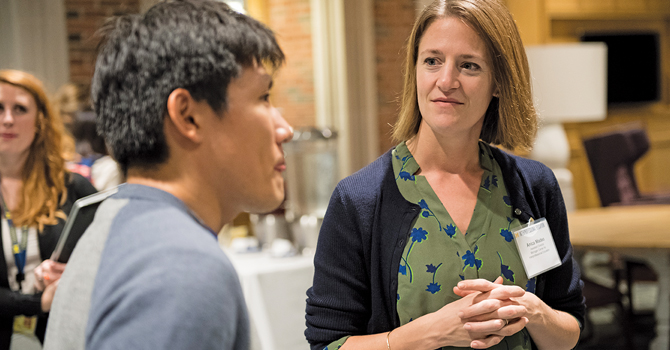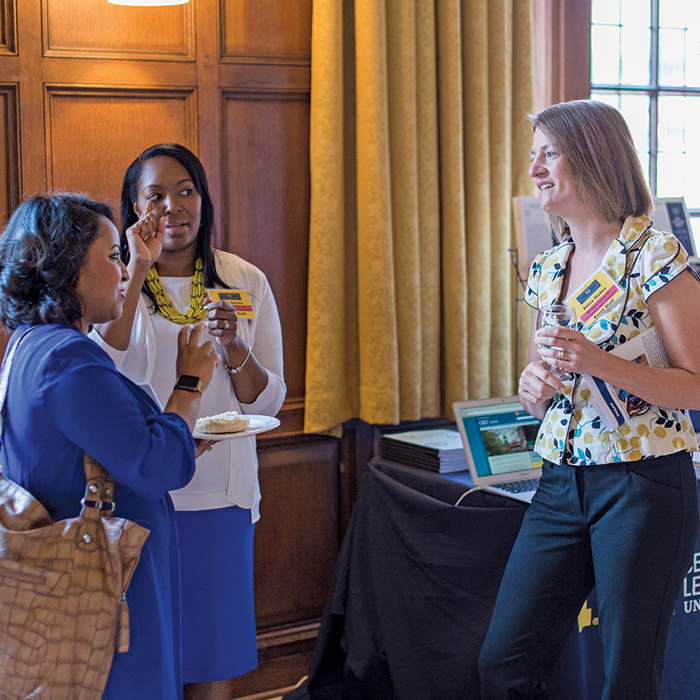A Diverse Toolbox

Anica Madeo
MPH and MSW ‘07
From West Virginia to Central America and finally to Ann Arbor, Anica Madeo never expected a career in higher education, let alone joining the staff at the U-M College of Pharmacy. Looking back, she sees that each step along the way gave her the tools she now uses every day in her current position.
Madeo graduated from West Virginia University majoring in speech pathology and audiology, after which she spent five years "finding herself," working odd jobs and traveling throughout the US and Central America. She worked with nongovernmental aid organizations in efforts such as teaching pregnant teens in a rural fishing village of Nicaragua and supporting the Nicaraguan Health Administration. In hindsight, she says, this is where she first became interested in what she later recognized as the field of public health.
When she returned to the US, Madeo's rationale for choosing Ann Arbor was that if she lived in a university town long enough, she would eventually go back to school. After spending some time waitressing downtown and working at the U-M International Center, her prediction came true when she was accepted into the dual program combining a master's in social work with the MPH program in the health behavior and health education department of SPH.
Many of Madeo's peers had their sights set on a specific public health niche they wanted to pursue. Madeo did not. Though occasionally this discrepancy was a point of insecurity, she began to realize that her diverse interests and experiences had in fact given her a broad set of skills that she could apply in a variety of public health settings. When she earned her degrees in 2007, she did just that. Madeo took a job at a nonprofit where her responsibilities ranged from grant writing to program evaluation to training community health workers. The work required her to travel often, which eventually motivated her to seek a more stationary position so she could grow her family.
Soon, her professional life was able to fit her personal one when a half-time position at U-M's College of Pharmacy became available. At first, Madeo says, her impression of pharmacy was dominated by the negative connotations of "Big Pharma," which made her feel like she was "selling out" and turning her back on her public health roots. But it did not take long for her to change her initial perception, which she now calls "shallow and inaccurate." She quickly realized how vital the roles of pharmacy and medications are in the health of populations and has found the College of Pharmacy to be "a great place with a lot of support for educational innovation."
 This openness to innovation allowed her to use her public health background to enrich
the curriculum there. First, Madeo was able to work with professors to develop a service-learning
class, exposing pharmacy students to the principles of public health and social justice.
By engaging deeply with important concepts like the social determinants of health,
the course allowed pharmacy students to broaden their knowledge and enhance their
careers. Since its first term, the course has opened up to students outside the College
of Pharmacy, offering an even greater range of perspectives in the classroom.
This openness to innovation allowed her to use her public health background to enrich
the curriculum there. First, Madeo was able to work with professors to develop a service-learning
class, exposing pharmacy students to the principles of public health and social justice.
By engaging deeply with important concepts like the social determinants of health,
the course allowed pharmacy students to broaden their knowledge and enhance their
careers. Since its first term, the course has opened up to students outside the College
of Pharmacy, offering an even greater range of perspectives in the classroom.
This class was one of many strategies aimed at integrating various health schools across campus. Madeo was working more and more with student groups, encouraging perspective and knowledge sharing, when a serendipitous occasion gave these successful small-scale initiatives new funding. A grant from the provost's Transforming Learning for a Third Century Initiative helped form the Michigan Center for Interprofessional Education at U-M, where Madeo now serves as the assistant director.
Today, Madeo not only draws on her public health knowledge in her new role but asserts that the center's goals are themselves a public health intervention. "Training future health professionals is a public health issue," she says. "Intervening to broaden their perspectives and help them develop skills in collaboration is an investment in the future health of our populations." The center focuses on student engagement because students are easily convinced of the importance of collaboration and intercultural skills. The more professionals entering professional life with this kind of training, the more equipped they will be to face major public health problems.
Madeo's role at the center is not what she expected for her career, but she has learned from her nontraditional path that success does not depend on having life mapped out. Because her public health background is rare in her current environment, she has realized what an asset it truly is. She encourages SPH students to recognize that the way they are taught to think is unique in and outside the field of public health. "Let your career surprise you," she counsels, and "fill your metaphorical toolbox along the way with as many skills and relationships as you can so that you may draw on them in the future."
This article first appeared in the spring 2017 issue of Findings, the magazine of the University of Michigan School of Public Health.
- Learn more about Health Behavior and Health Education at Michigan Public Health.
- Support student scholarships at Michigan Public Health.
